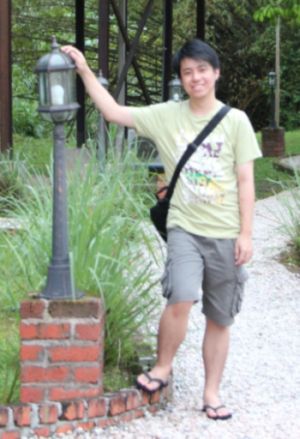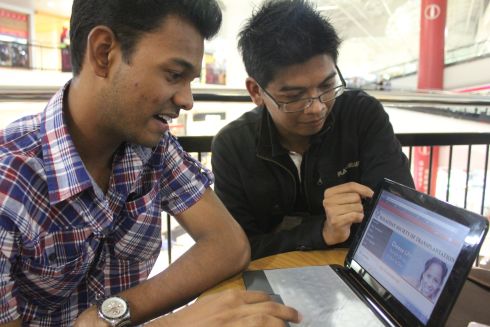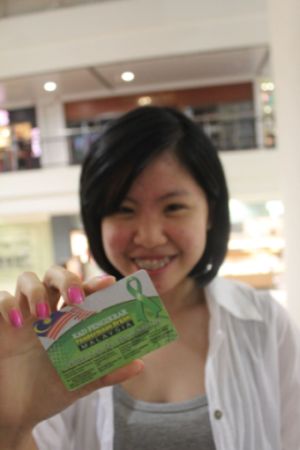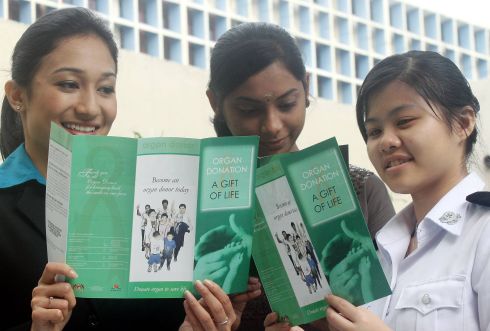By SHARMILA NAIR
alltherage@thestar.com.my
FOUR years ago, Chan Jin Feng did not know if he would live to see his 22nd birthday. A game of futsal or a movie were the furthest things from his mind. It had seemed like he was at death’s door.
He had been diagnosed with End Stage Renal Failure which caused his body to retain toxic waste.
“The doctors said that I could’ve died if I hadn’t been to the hospital when I did. I had to undergo dialysis to remove the toxins from my body. I had to focus on staying alive,” said Jin Feng, 25.
He underwent dialysis three times a week and each four-hour session was painful and uncomfortable.
“I had two big needles inserted in me, to obtain my blood for an artificial kidney to ‘cleanse’ it from toxins before returning it to my body,” said Jin Feng.
He was often lethargic and couldn’t lead an active, normal life. “I missed out on doing so many things with my friends and felt left out. I couldn’t believe that it was happening to me,” added Jin Feng, who resigned to his fate as a sickly young man.
But all that changed when he found a suitable kidney donor – his mother.
“The doctors suggested kidney transplant two years after my diagnosis as they wanted me to get stable before undergoing a major organ transplantation. My mum didn’t hesitate when she was told that she was a perfect donor.”
Jin Feng underwent the transplant about two years ago and is now practically a new man. He is wasting no time making up for all the fun he missed out on when he was sick and is doing everything that he was unable to do before.
“I am able to go out and pursue my dream career as a network engineer, and enjoy holidays all over the world. I can go out to watch movies and be with my friends. I never thought I would be able to lead a normal life again.
“I am really grateful that my mother didn’t hesitate to be my living donor. She gave me life – twice,” said Jin Feng.
Unfortunately, Jin Feng’s is one of the few lucky cases in Malaysia.
“Not many patients are able to find suitable living donor candidates among their family members and have to rely on the public for cadaveric organ donation instead. That is why organ donation is important,” said National Transplant Resource Centre (NTRC) chief national transplant procurement manager Datin Dr Lela Yasmin Mansor.
Most patients don’t just require kidneys, they are also in need of new lungs, hearts, livers, eyes and even skin to help lead a better life, and in some cases keep alive.
“A majority of our donors are cadaveric and are not even organ donor card carriers. The donation after death is actually initiated by family members,” she said.
Last year 27,205 Malaysians pledged to donate their organs after death, a 37% increase from the previous year.
The number of cadaveric donors also increased by 24% from 38 organ and tissue donors in 2010 to 47 in 2011.
Lela Yasmin said this resulted in three heart and lung transplants, seven liver transplants, 40 kidney transplants and 64 corneal transplants.
“Our organs can be used to help others and it won’t just benefit the recipients but their family members and society as well. We need more people to pledge as organ donors and have families that allow organs to be donated after their loved one’s death,” she added.
Making the pledge
Pledging as organ donors is not something we need to do in our old age or deathbeds. It can be done anytime in our lifetime.
Even those under 18 can pledge as organ donors provided they have the consent of their parents or legal guardians.
Chuan Aivee was 19 when she pledged as an organ donor. In 2009, she had read stories about how organ donation saved the life of heart transplant patient Tee Hui Yee and the stranger’s act of kindness inspired her to do the same one day.
Last year, she made the pledge.
“When we die, we are going to leave our body behind anyway. Why let the organs rot when they could be used to save someone’s life?” said Aivee, 20.
The STPM school-leaver was also inspired by Singapore’s Human Organ Transplant Act (Hota) under which a person is assumed to have agreed to donate his kidneys, heart, liver and corneas when he dies, unless he has signed an opt-out form.
“Everybody in Singapore is considered an organ donor, unless they opt out of it. It’s the opposite here and it shouldn’t be that way. More people should sign up as organ donors,” she said.
Carmen Wong, a Marketing Communication student chanced upon an organ donation campaign in her college two years ago. She had just watched a documentary on that topic a few days prior to that, and took it as a sign to pledge as a organ donor.
“Our bodies are just physical things anyway. If other people could benefit from my death, then why not?” said Carmen, 22.
She immediately signed up as a donor and decided to donate body parts such as eyes, lungs, heart, liver and skin.
However, Carmen admitted that as she was signing up, she had morbid images of a disfigured body without its major organs in a coffin.
“That is one of the biggest misconception people have regarding cadaveric organ donation.
“There is no disfigurement whatsoever. The procurement is done so carefully that an open casket funeral is actually possible,” said Lela Yasmin.
She added that another misconception many people have regarding organ donation is that it is against the religion.
“Every religion promotes kindness and giving. Organ donation is the last donation you can do in your life.”
What does religion say?
In truth, most major religions support the act of organ donation. However, there have been several disputes regarding this issue among Muslims, as some claim that organ donation is not allowed.
According to ex-Perlis mufti Dr Mohd Azri Zainal Abidin, organ donation is actually encouraged in Islam.
“There are several criteria a Muslim should think about before donating their organs. They have to ensure that all of the conditions are met before an organ could be taken out of their body,” said Mohd Azri.
The conditions are that organ donation can only be considered if there is no other way of saving a patient’s life. The procedure should not endanger the donor’s life and cannot be done for monetary, glamour or popularity reasons.
He also added that the donation should not be made for any kind of medical researches as that act is considered as done in vain.
“If you are willing to do this for the sole reason of saving another life, then go for it. The donation should be done out of the donor’s own willingness and mustn’t be forced in any way,” he said.
Mohd Azri also added that the donor should consult their family members before signing up as an organ donor.
“It is better to tell your relatives of your noble intention before you sign up for anything. Funeral is a serious matter and it should not be disrupted because of a dispute over organ donation.”
Family matters
When Carmen pledged as a donor, she didn’t stop to think about asking for her parents’ permission as she thought it was a personal choice. However, she also believed that her parents wouldn’t disapprove of her decision.
“They were shocked when I told them but they respected my choice. And I’m sure that – touch wood – if anything were to happen to me, they would honour my wishes.”
Aivee, on the other hand, called her parents a couple of times to make sure that they agreed with her decision. They didn’t stop her and in fact wanted to sign up as organ donors themselves.
Family’s approval is crucial when it comes to organ donation as there have been cases where family members deny the hospital from harvesting a donor’s organs. In such cases, the family’s final decision is respected.
“At the end of the day, the family has a say about the donation. We believe that things should be given with blessings and not taken by force. If family members are absolutely against the harvesting of the organs after death, we often respect their wishes,” said Lela Yasmin.
However, she added that lack of knowledge is main reason why people are still wary of donating their organs.
“Fear is what that’s stopping people from doing something that comes naturally to them – helping others. People should get the right information about organ donation and talk about it, discuss it with other people and promote awareness.”





Leave a reply